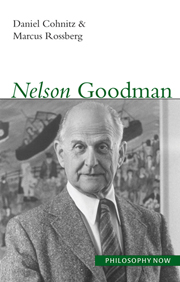Book contents
- Frontmatter
- Contents
- Acknowledgements
- Abbreviations
- 1 The worldmaker's universe
- 2 If this were an emerald it would be grue: problems and riddles of induction
- 3 The big picture
- 4 Particulars and parts
- 5 From Vienna Station to Boston Terminus
- 6 Follow the sign
- 7 Diagnosing art
- 8 Starmaking
- 9 Never mind mind, essence is not essential, and matter does not matter
- List of symbols
- Glossary of technical terms
- Further reading
- Notes
- Bibliography
- Index
2 - If this were an emerald it would be grue: problems and riddles of induction
- Frontmatter
- Contents
- Acknowledgements
- Abbreviations
- 1 The worldmaker's universe
- 2 If this were an emerald it would be grue: problems and riddles of induction
- 3 The big picture
- 4 Particulars and parts
- 5 From Vienna Station to Boston Terminus
- 6 Follow the sign
- 7 Diagnosing art
- 8 Starmaking
- 9 Never mind mind, essence is not essential, and matter does not matter
- List of symbols
- Glossary of technical terms
- Further reading
- Notes
- Bibliography
- Index
Summary
That the sun will rise every morning, that bread nourishes, that ravens are black and that matches will light when struck under favourable conditions are all truths about the world that we believe. Clearly, they are very helpful for us. Those just mentioned ah have in common that they express regularities that hold in the world. They tell us that a certain state of affairs is always followed by a certain other state of affairs, or that certain things always have certain features.
Regularities, expressed by general statements such as ‘all Fs are Gs’, are very valuable things to know when it comes to planning your day, driving a car, or just trying to survive for a while. Without knowledge of regularities, everything would always come as a complete surprise: be unexpected. It is easy to imagine how likely it would be that we all unintentionally killed ourselves within a couple of days without the capacity to have beliefs of regularities (possibly all by the same method, being unable to learn from the failure of others), given that our nosiness can overrule the guidance of our natural instincts.
Since regularities play such a big role for us, we developed (by some long process of cultural evolution) the sciences to find as many of them as there are, using methods that (we hope) put our beliefs in regularities on a firm basis.
- Type
- Chapter
- Information
- Nelson Goodman , pp. 28 - 53Publisher: Acumen PublishingPrint publication year: 2006



